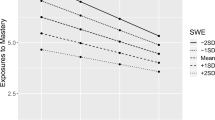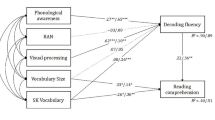Abstract
This study, which was drawn from a larger published work, examined language proficiency and literacy skills predictive of learning content and function words via the commonly used practice of flashcard word reading, which tests word knowledge in isolation. The current study also investigated differences in word learning performance between students of different language backgrounds (native and nonnative English speakers), and between students at the same grade level but in different alphabetic phases of word reading development. Kindergarten students (n = 81) practiced learning to read content and function words on flashcards. Analyses examined the extent to which students’ baseline English language skills, phonemic awareness, spelling knowledge, and/or word reading predicted performance on the word learning task. Results of linear regressions demonstrated that language skills accounted for a significant amount of unique variance in reading function words in isolation, but this was not the case for reading content words in isolation. Further, results indicated that baseline alphabetic phase, and not language background, moderated the relationship between language skills and word learning, such that language skills predicted function word learning only for full alphabetic readers and not partial alphabetic readers. Results are discussed in terms of implications for the teaching of function words as dependent on children’s relative phase of literacy development rather than their language backgrounds.
Similar content being viewed by others
References
Arra, C. T., & Aaron, P. G. (2001). Effects of psycholinguistic instruction on spelling performance. Psychology in the Schools, 38(4), 357–363. https://doi.org/10.1002/pits.1024.
August, D., & Shanahan, T. (Eds.). (2006). Developing literacy in second-language learners: Report of the national literacy panel on language minority children and youth. Mahwah, NJ: Lawrence Erlbaum.
August, D., & Shanahan, T. (Eds.). (2008). Developing reading and writing in second- language learners: Lessons from the report of the National Literacy panel on language-minority children and youth. New York, NY: Routledge.
Boyer, N., & Ehri, L. (2011). Contribution of phonemic segmentation instruction with letters and articulation pictures to word reading and spelling in beginners. Scientific Studies of Reading, 15(5), 440–470.
Castles, A., Rastle, K., & Nation, K. (2018). Ending the reading wars: Reading acquisition from novice to expert. Psychological Science in the Public Interest, 19, 5–51. https://doi.org/10.1177/1529100618772271.
Dunn, D. M., & Dunn, L. M. (2007). Peabody picture vocabulary test: Manual. London: Pearson.
Ehri, L. C. (1975). Word consciousness in readers and prereaders. Journal of Educational Psychology, 67(2), 204.
Ehri, L. C. (1976). Word learning in beginning readers and prereaders: Effects of form class and defining contexts. Journal of Educational Psychology, 68(6), 832.
Ehri, L. C. (1992). Reconceptualizing the development of sight word reading and its relationship to recoding. In P. B. Gough, L. C. Ehri, & R. Treiman (Eds.), Reading acquisition (pp. 107–143). Hillsdale, NJ: Erlbaum.
Ehri, L. C. (1998). Grapheme-phoneme knowledge is essential for learning to read words in English. In J. Metsala & L. Ehri (Eds.), Word recognition in beginning literacy (pp. 3–40). Mahwah, NJ: Erlbaum.
Ehri, L. C. (2005). Development of sight word reading: Phases and findings. In M. J. Snowling & C. Hulme (Eds.), The science of reading: A handbook (pp. 135–154). Malden: Blackwell. https://doi.org/10.1002/9780470757642.ch8.
Ehri, L. C. (2014). Orthographic mapping in the acquisition of sight word reading, spelling memory, and vocabulary learning. Scientific Studies of Reading, 18(1), 5–21. https://doi.org/10.1080/10888438.2013.819356.
Ehri, L. C. (2015). How children learn to read words. In A. Pollatsek & R. Treiman (Eds.), The Oxford handbook of reading (pp. 293–310). New York: Oxford University Press.
Ehri, L. C., & Roberts, K. T. (1979). Do beginners learn printed words better in contexts or in isolation? Child Development, 50(3), 675–685.
Ehri, L., & Wilce, L. (1980). Do beginners learn to read function words better in sentences or in lists? Reading Research Quarterly, 15(4), 451–477.
Garcia, O., & Kleifgen, J. A. (2010). Emergent bilinguals: Policies, programs, and practices for English language learners. New York: Teachers College Press.
Goldenberg, C. (2008). Teaching English language learners. American Educator. Retrieved from https://www.aft.org/sites/default/files/periodicals/goldenberg.pdf. Accessed 1 Dec 2015.
Goldenberg, C. (2013). Unlocking the research on English learners. American Educator, 37(2), 5.
Goldenberg, C., & Quach, S. R. (2010). Instructing English language learners: Assessing the state of our knowledge. ERS Spectrum, 28(1), 1–15.
Harris, A. J., & Jacobson, M. D. (1982). Basic reading vocabularies. New York: Macmillan.
Johnston, F. R. (2000). Word learning in predictable text. Journal of Educational Psychology, 92(2), 248. https://doi.org/10.1037//0022-0663.92.2.248.
Jorm, A. F., & Share, D. L. (1983). Phonological recoding and reading acquisition. Applied Psycholinguistics, 4(2), 103–147. https://doi.org/10.1017/s0142716400004380.
Joshi, R. M., Treiman, R., Carreker, S., & Moats, L. C. (2008). How words cast their spell. American Educator, 32(4), 6–16.
Kieffer, M. J. (2008). Catching up or falling behind? Initial English proficiency, concentrated poverty, and the reading growth of language minority learners in the United States. Journal of Educational Psychology, 100(4), 851–868. https://doi.org/10.1037/0022-0663.100.4.851.
Kieffer, M. J. (2010). Socioeconomic status, English proficiency, and late-emerging reading difficulties. Educational Researcher, 39(6), 484–486. https://doi.org/10.3102/0013189x10378400.
Kieffer, M. J., & Vukovic, R. K. (2012). Components and context: Exploring sources of reading difficulties for language minority learners and native English speakers in urban s chools. Journal of Learning Disabilities, 45(5), 433–452. https://doi.org/10.1177/0022219411432683.
McArthur, G., Castles, A., Kohnen, S., Larsen, L., Jones, K., Anandakumar, T., et al. (2015). Sight word and phonics training in children with dyslexia. Journal of Learning Disabilities, 48(4), 391–407. https://doi.org/10.1177/0022219413504996.
Miles, K. P., & Ehri, L. (2017). Learning to read words on flashcards: Effects of sentence contexts and word class in native and nonnative English-speaking kindergartners. Early Childhood Research Quarterly, 41, 103–113.
Miles, K. P., Rubin, G. & Gonzalez-Frey, S. G. (2017). Rethinking sight words: The interaction between students’ phonics knowledge and words’ spelling regularity. The Reading Teacher, 71(6), 715–726. https://doi.org/10.1002/trtr.1658.
Morris, D. (1992). Concept of word: A pivotal understanding in the learning-to-read process. In S. Templeton & D. Bear (Eds.), Development of orthographic knowledge and the foundations of literacy: A memorial festschrift for Edmund H. Henderson (pp. 53–77). Hillsdale, NJ: Erlbaum.
Morris, L. (2001). Going through a bad spell: What the spelling errors of young ESL learners reveal about their grammatical knowledge. Canadian Modern Language Review/La Revue Canadienne des Langues Vivantes, 58(2), 273–286.
Nation, K., Angell, P., & Castles, A. (2007). Orthographic learning via self-teaching in children learning to read English: Effects of exposure, durability, and context. Journal of Experimental Child Psychology, 96, 71–84. https://doi.org/10.1016/j.jecp.2006.06.004.
Neuman, S., Kaefer, T., Pinkham, A., & Strouse, G. (2014). Can babies learn to read? A randomized trial of baby media. Journal of Educational Psychology, 106(3), 815–830. https://doi.org/10.1037/a0035937.
Paivio, A. (1991). Dual coding theory: Retrospect and current status. Canadian Journal of Psychology, 45, 255–287. https://doi.org/10.1037/h0084295.
Shahar-Yames, D., & Share, D. L. (2008). Spelling as a self-teaching mechanism in orthographic learning. Journal of Research in Reading, 31(1), 22–39. https://doi.org/10.1111/j.1467-9817.2007.00359.x.
Share, D. L. (1995). Phonological recoding and self-teaching: Sin qua non of reading acquisition. Cognition, 55, 151–218. https://doi.org/10.1016/0010-0277(94)00645-2.
Share, D. L. (2008). Orthographic learning, phonological recoding, and self-teaching. Advances in Child Development and Behavior, 36, 31–82. https://doi.org/10.1016/s0065-2407(08)00002-5.
Solso, R. L., & King, J. F. (1976). Frequency and versatility of letters in the English language. Behavior Research Methods and Instrumentation, 8(3), 283–286. https://doi.org/10.3758/bf03201714.
Stuart, M., Masterson, J., & Dixon, M. (2000). Spongelike acquisition of sight vocabulary in beginning readers? Journal of Research in Reading, 23(1), 12–27. https://doi.org/10.1111/1467-9817.00099.
Uhry, J. K., & Shepherd, M. J. (1997). Teaching phonological recoding to young children with phonological processing deficits: The effect on sight-vocabulary acquisition. Learning Disability Quarterly, 20(2), 104–125. https://doi.org/10.2307/1511218.
U.S. Department of Education, National Center for Education Statistics. (2017). The condition of education 2017 (2017-144). English Language Learners in Public Schools. Washington: National Center for Education Statistics.
Wagner, R. K., Torgesen, J. K., & Rashotte, C. A. (1999). Comprehensive test of phonological processing: CTOPP. Austin, TX: Pro-ed.
Wang, H., Castles, A., Nickels, L., & Nation, K. (2011). Context effects on orthographic learning of regular and irregular words. Journal of Experimental Child Psychology, 109(1), 39–57. https://doi.org/10.1016/j.jecp.2010.11.005.
Weber, R. (2006). Function words in the prosody of fluent reading. Journal of Research in Reading, 29, 258–269. https://doi.org/10.1111/j.1467-9817.2006.00307.x.
Woodcock, R. W. (2011). Woodcock reading mastery test (WRMT-III). London: Pearson.
Acknowledgements
This research was supported in part by a grant from the Graduate Center, CUNY. A special thanks to Reba Rosen and Kathleen Tomes who served as research assistants. This research was conducted as part of a doctoral dissertation.
Author information
Authors and Affiliations
Corresponding author
Rights and permissions
About this article
Cite this article
Miles, K.P., McFadden, K.E. & Ehri, L.C. Associations between language and literacy skills and sight word learning for native and nonnative English-speaking kindergarteners. Read Writ 32, 1681–1704 (2019). https://doi.org/10.1007/s11145-018-9919-5
Published:
Issue Date:
DOI: https://doi.org/10.1007/s11145-018-9919-5




